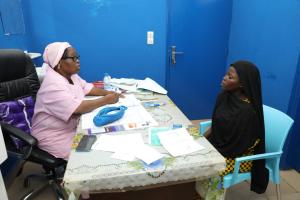Antenatal visits improve maternal health outcomes in Togo
Sokodé – In Togo, the health landscape is characterized by high morbidity and maternal mortality rates. According to the National Health Development Plan (NHDP 2023–2027), the maternal mortality rate in 2021 was 399 deaths per 100 000 live births, a slight improvement from the 401 deaths per 100 000 live births reported in the 2013–2014 Demographic and Health Survey (DHS).
Despite this progress, Togo is still far from achieving the Sustainable Development Goal (SDG) target of less than 70 deaths per 100 000 live births by 2030. This gap is largely due to insufficient healthcare coverage, especially in antenatal care. In rural areas, only 41.3% of births are attended by qualified personnel, and less than 10% of the population has health insurance.
In 2020, World Health Organization (WHO) supported the Togolese government in implementing its recommendations to enhance the quality of antenatal care to reduce pregnancy complications.
As a result of this initiative, the Ministry of Health adopted a new package of antenatal consultations (ANC) in 22 health facilities nationwide. The new model increased the number of maternal and foetal examinations from four to eight, aiming to detect complications early, improve communication between healthcare providers and pregnant women, and reduce the risk of stillbirth and pregnancy complications.
The Tchaoudjo Health District Polyclinic, located in central Togo, is one of the facilities where the new antenatal care (ANC) initiative is being implemented. “In the past, some women came just for delivery or to get their babies vaccinated, but now the number of female patients has increased significantly,” says Esso-Simna Potcho, a state-registered midwife at the Polyclinic. “Fortunately, since adopting the new guidelines, we have two dedicated rooms for ANC, which facilitates faster care delivery.”
Antenatal consultations cover essential aspects such as balanced diets, physical exercise, malaria and HIV prevention, and tetanus vaccination. They also address the management of common symptoms like nausea, back pain, and constipation.
WHO has also supported the implementation of programs like Wezou—meaning "breath of life" in Kabye—which guarantees free antenatal care and delivery for all pregnant women. Since its launch in the district, the antenatal care follow-up rate has increased from 86.1% in 2020 to 99.5% in 2023.
“I went for my first antenatal visit here at the Polyclinic because I knew it was free of charge, the equipment is clean, and the health personnel are qualified,” says Assana Ouro Akpo, a mother of two.
In addition to providing healthcare, the Wezou programme also supplies essential medical products, including intermittent preventive treatment (IPT), iron supplements, and long-lasting insecticide-treated mosquito nets. "Thanks to Wezou, thousands of Togolese women have been able to access quality healthcare without worrying about financial constraints," says Mr. N'Djao Akawulu, Tchaoudjo District Health Director.
In Togo, maternal deaths are primarily caused by hemorrhage (47%), eclampsia (24%), and infections (13%). These complications can largely be prevented through quality care and regular antenatal follow-ups.
To raise awareness about antenatal care, community health workers (CHWs) conduct three home visits in addition to the eight antenatal consultations at health centres. “The role of CHWs is to identify pregnant women in their region, recognize those who do not attend consultations regularly, and conduct home visits,” explains Dr Abdel Aziz Mohamed Boubacar, Reproductive, Maternal, and Neonatal Health Officer at WHO Togo. "This approach helps increase the rate of antenatal consultations and prevent avoidable maternal deaths."
To support these new initiatives, WHO has developed the Maternal and Perinatal Death Surveillance and Response (MPDSR) system. Additionally, a partnership with the National School of Health Care Assistants of Sokodé (ENASS) in Tchaoudjo District is contributing to training and developing the skills of future health professionals.
“Thanks to antenatal visits, I can ensure the health and safety of my baby, and such visits make it easy for midwives to quickly find solutions when necessary. This reassures me because I am properly followed up,” concludes Assana.
Communications Officer
Regional Office for Africa
Email: lawsonagbluluf [at] who.int (lawsonagbluluf[at]who[dot]int)
Chargé de communication
OMS Togo
Email : niangi [at] who.int (niangi[at]who[dot]int)
